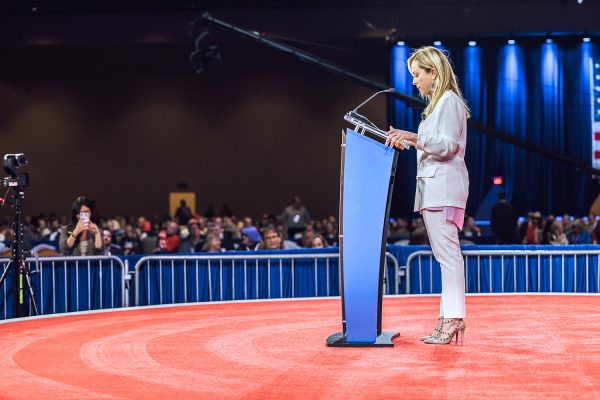
Italy’s next coalition government will likely consist of three right-wing parties: the Brothers of Italy, League and Forza Italia (Forward Italy) are polling at close to 50 percent support, which should be enough to give them control of both chambers of parliament.
For the first time, the Brothers of Italy, who split from Forza in 2012, would place first and provide the prime minister: Giorgia Meloni.
The (formerly Northern) League, led by Matteo Salvini, won the election in 2018, but conservatives were disappointed when it formed a government with the left-populist Five Star Movement, and even more disappointed when Salvini left the government in a failed bid to force snap elections.
Forza has been in third place since their leader, Silvio Berlusconi, lost reelection in 2013.
The parties have released a joint manifesto for the election in September that is light on detail but nevertheless provides the best clues about what a right-wing government might do. Here are the main points.
Fiscal policy
- Raise the 15-percent “flat tax” on self-employed earnings from €65,000 to €100,000 per year.
This isn’t really a flat tax, but rather a tax break for entrepreneurs and freelancers. An actual flat tax of 15 percent would cost the government around €40 billion in revenue, or 2 percent of GDP.
Conservatives have argued for a flat income tax since 1994 but never implemented it. I analyzed the pros and cons of such a flat tax here during the election campaign of 2018.
- Amend Italy’s EU-funded coronavirus recovery plan “due to the changed conditions, needs and priorities.”
The manifesto doesn’t specify what changes the parties want to make.
Outgoing prime minister Mario Draghi prioritized the biggest and most expensive reforms in his recovery program (highlights here). So far Italy has received €67 out of €191 billion in EU funds. The next tranche consists of €19 billion in payments for 55 objectives, including reforming competition laws, streamlining the justice system and cracking down on tax evasion.
Those have not been priorities for the League and Forza. The former opposes liberalization of beach clubs and the taxi market, the latter opposes reforms that would speed up trials (Berlusconi’s trial for tax fraud lasted eight years) and rationalize the land registry, which could result in higher property taxes. (Berlusconi called for repeal of the property tax in 2013.)
Foreign policy
- The manifesto pledges “full adherence to the process of European integration.”
Even when the parties will inevitably fight with the European Commission over money, at least we know Italy won’t leave the EU. In the past, the Brothers and League toyed with giving up the euro.
- The parties also vow to “respect the commitments made to NATO,” including increased defense spending.
Berlusconi and Salvini were once among Vladimir Putin’s best friends in Europe. Meloni, more than the two men, has taken a hard line since Russia invaded Ukraine in February.
Social policy
- Increase minimum pensions and expand opportunities for early retirement.
Italy has one of the world’s oldest populations and spends more on pensions than any other EU country except Greece: 16 percent of its national income.
Officially the pension age is 67, but the outgoing government allowed retirement at 64 under various conditions. In the past, public-sector workers were able to retire even in their fifties.
- Increase free nurseries and raise child benefits.
- Replace the “citizens’ income” with “more effective measures of social inclusion and job creation.”
The “citizens’ income” is really a guaranteed minimum income for jobseekers. It was introduced by the Five Star Movement in 2019 as a step toward a universal basic income. The League only agreed to it because it got its 15-percent flat-tax-that-isn’t-a-flat-tax in return. Now it would abolish the citizens’ income for the poor and extend the low tax rate to higher incomes.
Immigration
- Work with North African authorities to block migrant boats.
- Create EU-run “hot spots” to assess asylum requests abroad.
Cooperation with Libya, an Italian colony until 1951, has been haphazard since Muammar Gaddafi was overthrown in 2011.
Migrants are meant to apply for status in the first EU country they arrive in, but that principle was let go in 2015, when Italy, frustrated that other European countries did little to help it process a record influx of asylum seekers, would wave people through and Germany started to accept asylum applications from migrants who had crossed Italy without registering.
Most asylum seekers from countries in Africa and South Asia are rejected — half of the 56,000 asylum requests in 2021 were turned down — but migrants seldom return. They are more likely to remain in Italy illegally or try for asylum in another EU country.
